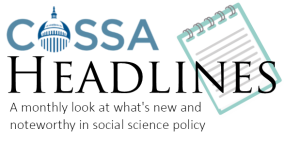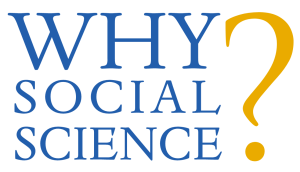Issue 05 (March 5)
COSSA Washington Update, Volume 38 Issue 5
Featured News
COSSA in Action
- March’s Headlines Webchat to Feature Deep Dive on FY 2020 Budget Request
- Anthropologist Lee Hoffer Answers “Why Social Science?”
- Letters & Statements
Congressional News
Federal Agency & Administration News
- NIH Publishes Update on Efforts to Address Sexual Harassment in Science
- Nomination Opportunities
- Funding Opportunities
- Notices & Requests for Comment
- Open Positions
- Fellowships & Professional Development
Community News & Reports
March’s Headlines Webchat to Feature Deep Dive on FY 2020 Budget Request

COSSA members are encouraged to sign up for the monthly Headlines webchat on March 14 at 2:00 pm Eastern, in which COSSA staff will recap the most important social and behavioral science news from the past month and answer participants’ questions. The March chat will feature a deep dive discussion with COSSA staff on the Trump Administration’s budget request for fiscal year (FY) 2020. Individuals employed by or affiliated with a COSSA member organization or university can register for the webchat here.
Anthropologist Lee Hoffer Answers “Why Social Science?”
 The latest Why Social Science? guest post comes from Lee Hoffer, Associate Professor of Medical Anthropology at Case Western Reserve University, who writes about how participatory research involving people suffering from substance use disorders can give us new perspectives on addiction. Read it here and subscribe.
The latest Why Social Science? guest post comes from Lee Hoffer, Associate Professor of Medical Anthropology at Case Western Reserve University, who writes about how participatory research involving people suffering from substance use disorders can give us new perspectives on addiction. Read it here and subscribe.
Trump Administration to Release FY 2020 Budget Request Next Week
The Trump Administration is planning to release its fiscal year (FY) 2020 Budget Request in batches over the next couple of weeks. Due to the 35-day partial government shutdown and delayed ending to the FY 2019 appropriations process (see previous coverage), the President’s budget, which is supposed to be delivered to Congress in early February, is not expected until mid-March. Reports indicate that preliminary details will be released the week of March 11 with full details available the week of March 18.
The research community is expecting another tough year for federal science agencies and programs, especially as the President has hinted at his plans to increase defense spending at the expense of non-defense discretionary spending, which includes federal research funding. As always, COSSA will prepare an in-depth analysis of the proposals for agencies and programs important to our community.
It is important to note that the President’s budget is just that – a budget. Congress is not waiting for the President’s request to be delivered to begin their work on the annual appropriations bills. Oversight hearings are already beginning, and generally, the President’s request is expected to have little bearing on Congress’s funding deliberations.
NIH Seeks Input on the Need for an Administrative Data Enclave
The National Institutes of Health (NIH) has issued a Request for Information (RFI) on the potential development of a secure data enclave within the NIH using existing funds. This enclave would allow approved research organizations to access sensitive non-public NIH information such as information on peer review outcomes, grant progress reports, and demographic information of NIH grant applicants. NIH approval would be required for researchers to access the data. The NIH is seeking information about this proposed data enclave including examples of research that is currently not pursuable without such access, whether the benefits of a data enclave are worth the opportunity cost of the necessary NIH funds, preferences about accessing a data enclave virtually or in a designated physical location, quantity of “seats” of researchers given access to the data enclave, examples of high level data protection procedures, and examples of potential research outputs from a data enclave. NIH’s Deputy Director for Extramural Research Mike Lauer published a blog post discussing the RFI in greater detail. Responses can be submitted here by May 30, 2019.
NIH Publishes Update on Efforts to Address Sexual Harassment in Science
On February 28, the Office of the Director of the National Institutes of Health (NIH) released an update on efforts underway at NIH to address sexual harassment in science. The update outlines that, following the National Academies of Sciences’ report on sexual harassment of women in science, NIH established the Working Group of the Advisory Committee to the Director (ACD) on Changing the Culture to End Sexual Harassment. The task of the working group is to assess the current state of sexual harassment, advise on accountability measures, propose policies, and develop strategies for encouraging research on anti-harassment policies and measures of their effectiveness. The Working Group met for the first time this month and will report interim recommendations in June and provide a final report and recommendations to the ACD in December. The update also lists several themes that will be at the center of the working group’s recommendations including demonstrating accountability and transparency, clarifying expectations for institutions and investigators to ensure a safe workplace and inform the agency, providing clear channels of communication to NIH, and listening to victims and survivors of sexual harassment and incorporating their perspectives into future actions. More information can be found in the NIH website.
NASEM Report Evaluates Strategies for Reducing Child Poverty
In response to a 2015 Congressional directive to conduct a comprehensive study of child poverty in the United States, the National Academies of Sciences, Engineering, and Medicine has released a new report, A Roadmap to Reducing Child Poverty. The consensus study report evaluates the evidence surrounding the efficacy of existing federal programs such as the Earned Income Tax Credit and the Supplemental Nutrition Assistance Program (SNAP) and proposes a strategy for reducing the child poverty rate in the United States by half over the next decade. The authoring committee identifies several priority areas for research, including developing effective work-oriented child poverty reduction programs, program administration that enhances the stability of low-income families, and reducing barriers to accessing assistance programs. The report also recommends improving data collection and measurement (including developing a health-inclusive poverty measure), continued monitoring and program evaluation, and better coordination of research and data priorities across departments. The full report can be accessed on the National Academies website.

